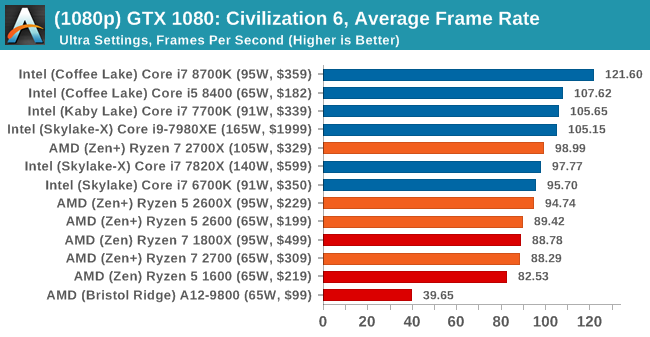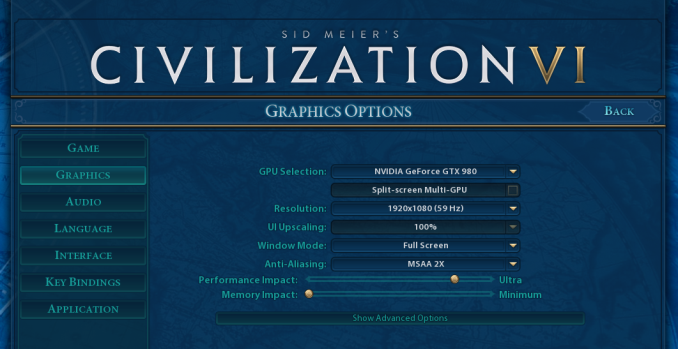The AMD 2nd Gen Ryzen Deep Dive: The 2700X, 2700, 2600X, and 2600 Tested
by Ian Cutress on April 19, 2018 9:00 AM ESTCivilization 6
First up in our CPU gaming tests is Civilization 6. Originally penned by Sid Meier and his team, the Civ series of turn-based strategy games are a cult classic, and many an excuse for an all-nighter trying to get Gandhi to declare war on you due to an integer overflow. Truth be told I never actually played the first version, but every edition from the second to the sixth, including the fourth as voiced by the late Leonard Nimoy, it a game that is easy to pick up, but hard to master.
Benchmarking Civilization has always been somewhat of an oxymoron – for a turn based strategy game, the frame rate is not necessarily the important thing here and even in the right mood, something as low as 5 frames per second can be enough. With Civilization 6 however, Firaxis went hardcore on visual fidelity, trying to pull you into the game. As a result, Civilization can taxing on graphics and CPUs as we crank up the details, especially in DirectX 12.
Perhaps a more poignant benchmark would be during the late game, when in the older versions of Civilization it could take 20 minutes to cycle around the AI players before the human regained control. The new version of Civilization has an integrated ‘AI Benchmark’, although it is not currently part of our benchmark portfolio yet, due to technical reasons which we are trying to solve. Instead, we run the graphics test, which provides an example of a mid-game setup at our settings.
At both 1920x1080 and 4K resolutions, we run the same settings. Civilization 6 has sliders for MSAA, Performance Impact and Memory Impact. The latter two refer to detail and texture size respectively, and are rated between 0 (lowest) to 5 (extreme). We run our Civ6 benchmark in position four for performance (ultra) and 0 on memory, with MSAA set to 2x.
For reviews where we include 8K and 16K benchmarks (Civ6 allows us to benchmark extreme resolutions on any monitor) on our GTX 1080, we run the 8K tests similar to the 4K tests, but the 16K tests are set to the lowest option for Performance.
All of our benchmark results can also be found in our benchmark engine, Bench.
MSI GTX 1080 Gaming 8G Performance
1080p



4K



8K



16K
















545 Comments
View All Comments
fallaha56 - Thursday, April 19, 2018 - link
I’m not -I’m jst showing how stupid your OP wasIf someone is selling an entry level chip for the same price as someone else’s that’s the comparison
Include the platform costs if you like but that’s what matters -bang for buck
Only for .1% of people does performance at any costs matter
Ninjawithagun - Thursday, April 19, 2018 - link
Actually no. Once again proving you do not know how to count to 8.LurkingSince97 - Thursday, April 19, 2018 - link
Um... NO.Sure, in some cases it is possible to compare two processors of 'equal quality' and then look at cost second.
But that is an impossible task in a review. And for some processors it is impossible for anyone.
This is impossible because there is no such thing as an 'equal quality chip'. Subjectively, I might be able to find two chips that I think are roughly equal, then compare price. But this is subjective -- depending on what my needs are.
Price is objective. We can compare two system builds at nearly equal cost directly, then see what is better. Comparing 'roughly equal' chips first starts out in the wrong place for most consumers. Only those that are not very price sensitive do that -- get the 'best' for what they want, and if there are two equal things use price as a tie breaker. Most people are looking for the best they can get for a price, rather than the lower price for what they want.
Now, to make it worse, by your reasoning the 2700X can not be compared to anything, because the core counts differ. Bull$#17. I could just as easily say that the 8700K can not be compared to the 2600X because it can overclock to 5Ghz, so they are not technically the same.
There is absolutely reason to compare 8C/16T products to 6C/12T to 4C/8T products -- BECAUSE PEOPLE HAVE TO PICK ONE TO BUY.
LurkingSince97 - Thursday, April 19, 2018 - link
Incorrect. Q.E.D.bji - Thursday, April 19, 2018 - link
You are completely wrong, and Krysto is correct. Performance per dollar is the metric of greatest relevance for the vast majority of users and thus is the most useful metric to use in reviews.mapesdhs - Saturday, April 21, 2018 - link
Maybe Ninjawithagun is just crazy rich and doesn't care about price. :)Targon - Monday, April 23, 2018 - link
Performance per dollar for the workload you care about is what you are talking about, since game performance doesn't matter much in business, but being able to do whatever the day to day work as quickly as possible is. That may mean lower core counts with high clock speeds will be more important, or higher core counts will beat out most other things(16+ cores at 1.5GHz might beat out 4 cores at 5GHz). It all depends.Ryan Smith - Thursday, April 19, 2018 - link
"Why does every review keep making the same mistake?? It has nothing to do with price. Comparing like CPU architectures is the only logical course of action."To abuse an already overused meme here, why not both? This is why we have the data for all of these parts.
Our focus is on price comparisons, because at the end of the day most readers will make their buying decisions around a given budget. But there is also plenty here looking into IPC and other architectural elements.
Cooe - Thursday, April 19, 2018 - link
Lol don't feed him Ryan! As one of our so gracious and glorious overloads it pains me to see you get into the mud with that dingus. Leave that to us nobodies :).Ninjawithagun - Thursday, April 19, 2018 - link
Ignorance is your bliss.